
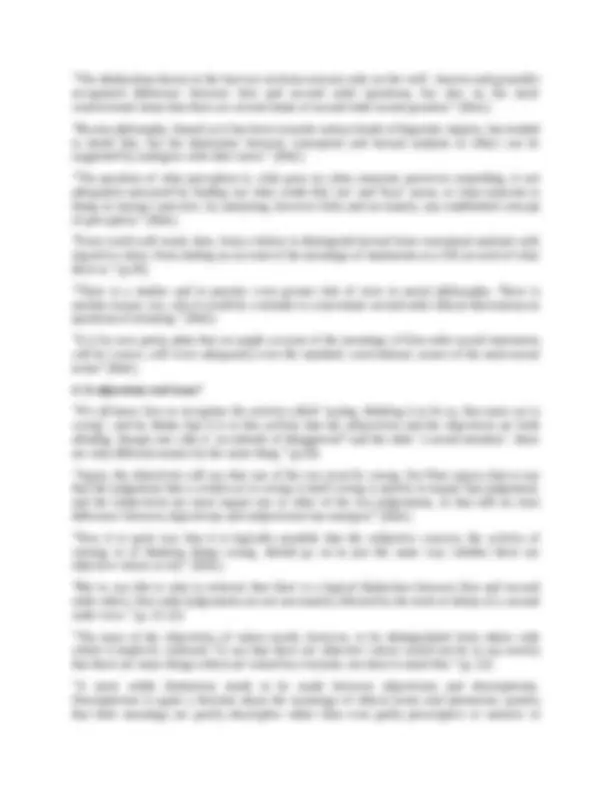
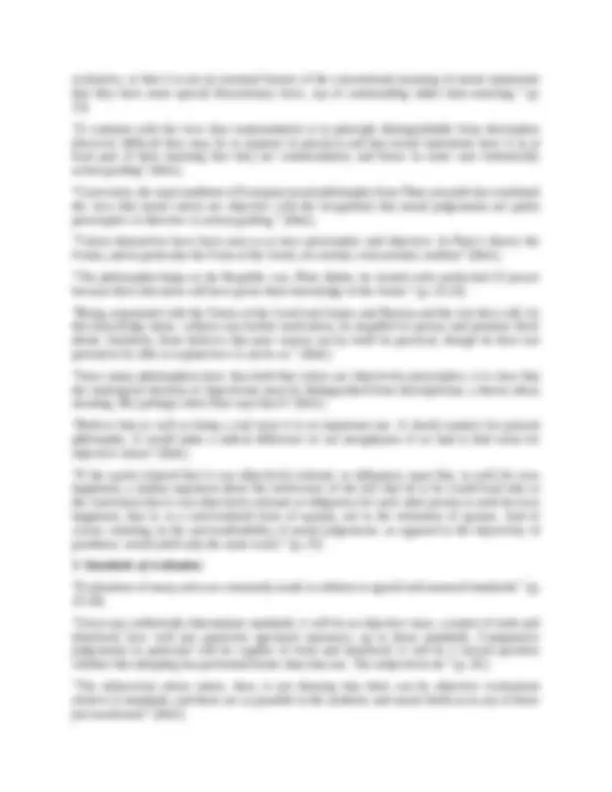
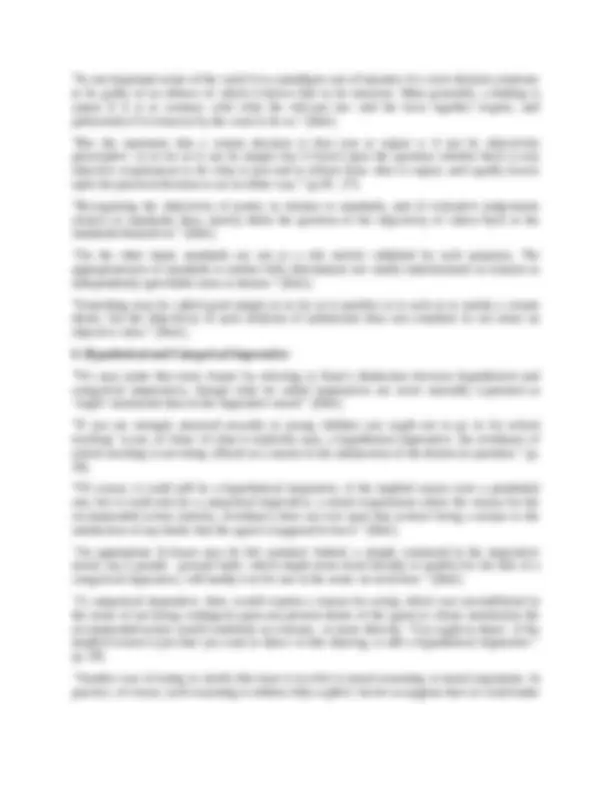
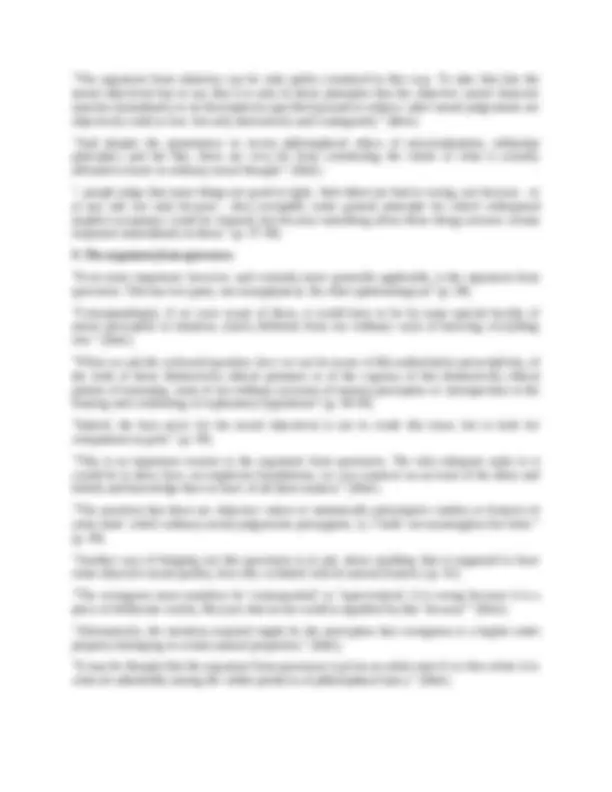
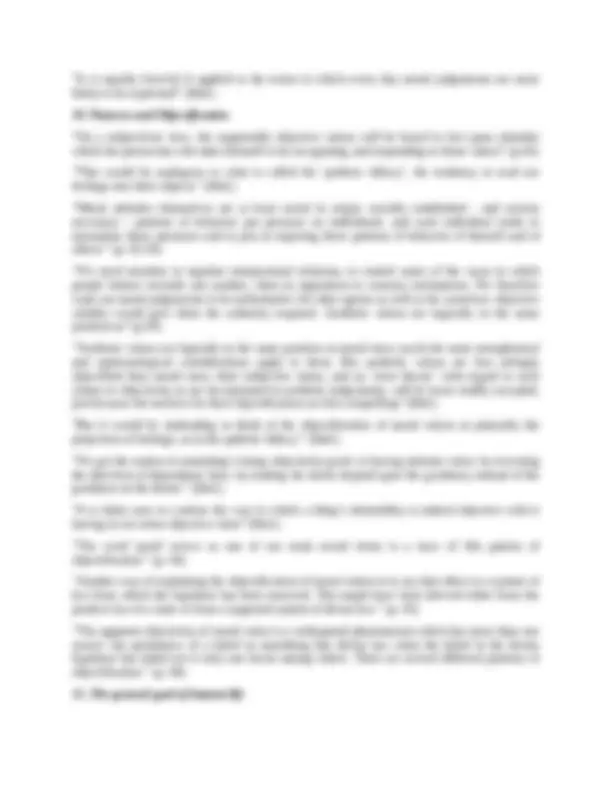



Study with the several resources on Docsity

Earn points by helping other students or get them with a premium plan


Prepare for your exams
Study with the several resources on Docsity

Earn points to download
Earn points by helping other students or get them with a premium plan
Community
Ask the community for help and clear up your study doubts
Discover the best universities in your country according to Docsity users
Free resources
Download our free guides on studying techniques, anxiety management strategies, and thesis advice from Docsity tutors
This document is This is about chapter 1 of the book written by J.L Mackie entitled Investing Right and Wrong
Typology: Summaries
1 / 10

This page cannot be seen from the preview
Don't miss anything!







Chapter 1 The Subjectivity of Values
1. Moral Scepticism “The statement of this thesis is liable to provoke one of three very different reactions. Some will think it not merely false but pernicious; they will see it as a threat to morality and to everything else that is worthwhile. and they will find the presenting of such a thesis in what purports to be a book on ethics paradoxical or even outrageous.” (p. 15) “Others will regard it as a trivial truth. almost too obvious to be worth mentioning. and certainly, too plain to be worth much argument. Others again will say that it .is meaningless or empty, that no real issue is raised by the question whether values are or are not part of the fabric of the world. But. precisely because there can be these three different reactions. much more needs to be said.” (Ibid.) “The claim that values are not objective, are not part of the fabric of the world, is meant to include not only moral goodness, which might be most naturally equated with moral value, but also other things that could be more loosely called moral values or disvalues - rightness and wrongness, duty, obligation, an action’s being rotten and contemptible and so on.” (Ibid.) “It also includes non-moral values, notably aesthetic ones, beauty and various kinds of artistic merit. I shall not discuss these explicitly, but clearly much the same considerations apply to aesthetic and to moral values. and there would be at least some initial implausibility in a view that gave the one a different status from the other.” (Ibid.) “Moral Scepticism might also be used as a name for either of two first order views, or perhaps for an incoherent mixture of the two” (p.16) “A moral sceptic might be the sort of person who says ‘All this talk of morality is tripe,’ who rejects morality and will take no notice of it.” (Ibid.) “Such a person may be literally rejecting all moral judgements; he is more likely to be making moral judgements of his own, expressing a positive moral condemnation of all that conventionally passes for morality; or he may be confusing these two logically incompatible views, and saying that he rejects all morality, while he is in fact rejecting only a particular morality that is current in the society in which he has grown up.” (Ibid.) “These are first order moral views, positive or negative: the person who adopts either of them is taking a certain practical, normative, stand. By contrast, what I am discussing is a second order view, a view about the status of moral values and the nature of moral valuing, about where and how they fit into the world.” (Ibid.) “These first and second order views are not merely distinct but completely independent: one could be a second order moral sceptic without being a first order one, or again the other way round A man could hold strong moral views, and indeed ones whose” (Ibid.) “A man could hold strong moral views, and indeed ones whose content was thoroughly conventional, while believing that they were simply attitudes and policies with regard to conduct that he and other people held. Conversely, a man could reject all established morality while believing it to be an objective truth that it was evil or corrupt.” (Ibid.)
“Moral scepticism would seem not so much pernicious as absurd. How could anyone deny that there is a difference between a kind action and a cruel one, or that a coward and a brave man behave differently in the face of danger?” (Ibid.) “The kinds of behavior to which moral values and disvalues are ascribed are indeed part of the furniture of the world, and so are the natural, descriptive differences between them; but not, perhaps, their differences in value.” (Ibid.)
2. Subjectivism “Another name often used, as an alternative to 'moral scepticism’, for the view I am discussing is ‘subjectivism’.” (p. 17) “Moral subjectivism too could be an order, nonnative, view, namely that everyone really ought to do whatever he thinks he should.” (Ibid.) “This plainly is a (systematic) first order view; on examination it soon ceases to be plausible, but that is beside the point, for it is quite independent of the second order thesis at present under consideration. What is more confusing is that different second order views compete for the name ‘subjectivism’.” (Ibid.) “What is often called moral subjectivism is the doctrine that, for example, ‘This action is right’ means ‘I approve of this action’. or more generally that moral judgements are equivalent to reports of the speaker’s own feelings or attitudes.” (Ibid.) “First, what I have called moral scepticism is a negative doctrine, not a positive one: it says what there isn’t, not what there is. It says that there do not exist entities or relations of a certain kind, objective values or requirements, which many people have believed to exist.” (Ibid.) “Secondly, what I have called moral scepticism is an ontological thesis, not a linguistic or conceptual one. It is not, like the other doctrine often called moral subjectivism, a view about the meanings of moral statements.” (p. 18) “It is true that those who have accepted the moral subjectivism which is the doctrine that moral judgements are equivalent to reports of the speaker's own feelings or attitudes have usually presupposed what I am calling moral scepticism.” (Ibid.) “Indeed, if all our moral statements were such subjective reports, it would follow that, at least so far as we are aware. there are no objective moral values. If we were aware of them, we would say something about them” (Ibid.) “. No doubt if moral values are not objective, they are in some very broad sense subjective, and for this reason I would accept 'moral subjectivism’ as an alternative name to ‘moral scepticism’. But subjectivism it this broad sense must be distinguished from the specific doctrine about meaning referred to above.” (Ibid.) 3. The Multiplicity of second order questions “The distinctions drawn in the last two sections rest-not only on the well - known and generally recognized difference between first and second order questions, but also on the more controversial claim that there are several kinds of second order moral question.” (p.19)
evaluative, or that it is not an essential feature of the conventional meaning of moral statements that they have some special illocutionary force, say of commending rather than asserting.” (p.
“It contrasts with the view that commendation is in principle distinguishable from description (however difficult they may be to separate in practice) and that moral statements have it as at least part of their meaning that they are commendatory and hence in some uses intrinsically action-guiding” (Ibid.) “Conversely, the main tradition of European moral philosophy from Plato onwards has combined the view that moral values are objective with the recognition that moral judgements are partly prescriptive or directive or action-guiding.” (Ibid.) “Values themselves have been seen as at once prescriptive and objective. In Plato’s theory the Forms, and in particular the Form of the Good, are eternal, extra-mental, realities” (Ibid.) “The philosopher-kings in the Republic can, Plato thinks, be trusted with unchecked 23 power because their education will have given them knowledge of the forms.” (p. 23-24) “Being acquainted with the Forms of the Good and Justice and Beauty and the rest they will, by this knowledge alone, without any further motivation, be impelled to pursue and promote these ideals. Similarly, Kant believes that pure reason can by itself be practical, though he does not pretend to be able to explain how it can be so.” (Ibid.) “Since many philosophers have thus held that values are objectively prescriptive, it is clear that the ontological doctrine of objectivism must be distinguished from descriptivism, a theory about meaning. But perhaps when Hare says that h” (Ibid.) “Believe that as well as being a real issue it is an important one. It clearly matters for general philosophy. It would make a radical difference to our metaphysics if we had to find room for objective values” (Ibid.) “If the egoist claimed that it was objectively rational, or obligatory upon him, to seek his own happiness, a similar argument about the irrelevance of the fact that he is he would lead only to the conclusion that it was objectively rational or obligatory for each other person to seek his own happiness, that is, to a universalized form of egoism, not to the refutation of egoism. And of course, insisting on the universalizability of moral judgements. as opposed to the objectivity of goodness, would yield only the same result.” (p. 25)
5. Standards of evaluation “Evaluations of many sorts are commonly made in relation to agreed and assumed standards.” (p, 25-26) “Given any sufficiently determinate standards, it will be an objective issue, a matter of truth and falsehood, how well any particular specimen measures- up to those standards. Comparative judgements in particular will be capable of truth and falsehood: it will be a factual question whether this sheepdog has performed better than that one. The subjectivist ab.” (p. 26.) “The subjectivist about values. then, is not denying that there can be objective evaluations relative to standards, and these are as possible in the aesthetic and moral fields as in any of those just mentioned.” (Ibid.)
“In one important sense of the word it is a paradigm case of injustice if a court declares someone to be guilty of an offence of which it knows him to be innocent. More generally, a finding is unjust if it is at variance with what the relevant law and the facts together require, and particularly if it is known by the court to be so.” (Ibid.) “But the statement that a certain decision is thus just or unjust w il not be objectively prescriptive: in so far as it can be simply true it leaves open the question whether there is any objective requirement to do what is just and to refrain from what is unjust, and equally leaves open the practical decision to act in either way.” (p.26 - 27) “Recognizing the objectivity of justice in relation to standards, and of evaluative judgements relative to standards, then, merely shifts the question of the objectivity of values back to the standards themselves.” (Ibid.) “On the other hand, standards are not as a rule strictly validated by such purposes. The appropriateness of standards is neither fully determinate nor totally indeterminate in relation to independently specifiable aims or desires.” (Ibid.) “Something may be called good simply in so far as it satisfies or is such as to satisfy a certain desire; but the objectivity of such relations of satisfaction does not constitute in our sense an objective value.” (Ibid.)
6. Hypothetical and Categorical Imperatives “We may make this issue clearer by referring to Kant’s distinction between hypothetical and categorical imperatives, though what he called imperatives are more naturally expressed as ‘ought’-statements than in the imperative mood.” (Ibid.) “If you are strongly attracted sexually to young children you ought not to go in for school teaching’ is not, in virtue of what it explicitly says, a hypothetical imperative: the avoidance of school teaching is not being offered as a means to the satisfaction of the desires in question.” (p.
“Of course, it could still be a hypothetical imperative, if the implied reason were a prudential one; but it could also be a categorical imperative, a moral requirement where the reason for the recommended action (strictly, avoidance) does not rest upon that action's being a means to the satisfaction of any desire that the agent is supposed to have.” (Ibid.) “An appropriate if-clause may be left unstated. Indeed, a simple command in the imperative mood, say a parade - ground order, which might seem most literally to qualify for the title of a categorical imperative, will hardly ever be one in the sense we need here.” (Ibid.) “A categorical imperative, then, would express a reason for acting which was unconditional in the sense of not being contingent upon any present desire of the agent to whose satisfaction the recommended action would contribute as a means - or more directly: ‘You ought to dance'. if the implied reason is just that you want to dance or like dancing, is still a hypothetical imperative.” (p. 29) “Another way of trying to clarify this issue is to refer to moral reasoning or moral arguments. In practice, of course, such reasoning is seldom fully explicit: but let us suppose that we could make
objective values can carry with it an extreme emotional reaction, a feeling that nothing matters at all that life has lost its purpose.” (p. 34) “A claim to objectivity has been so strongly associated with their subjective concerns and purposes that the collapse of the former seems to undermine the latter as well. This view, that conceptual analysis would reveal a claim to objectivity, is sometimes dramatically confirmed by philosophers who are officially on the other side.” (Ibid.) “That ordinary moral judgements include a claim to objectivity, an assumption that there are objective values in just the sense in which I am concerned to deny this.” (p. 35) “If second order ethics were confined, then, to linguistic and conceptual analysis, it ought to conclude that moral values at least are objective: that they are so is part of what our ordinary moral statements mean: the traditional moral concepts of the ordinary man as well as of the main line of western philosophers are concepts of objective value. But it is precisely for this reason that linguistic and conceptual analysis is not enough.” (Ibid.) “The claim to objectivity, however ingrained in our language and thought, is not self-validating. It can and should be questioned. But the denial of objective values will have to be put forward not as the result of an analytic approach, but as an ‘error theory’” (Ibid.) “But since this is an error theory, since it goes against assumptions ingrained in our thought and built into some of the ways in which language is used, since it conflicts with what is sometimes called common sense, it needs very solid support” (Ibid.) “Traditionally it has been supported by arguments of two main kinds, which I shall call the argument from relativity and the argument from queerness, but these can, as I shall show, be supplemented in several ways.” (Ibid.)
8. The argument from relativity “The argument from relativity has as its premises the well-known variation in moral codes from one society to another and from one period to another, and also the differences in moral beliefs between different groups and classes within a complex community.” (p. 36) “. Disagreement on questions in history or biology or cosmology does not show that there are no objective issues in these fields for investigators to disagree about” (Ibid.) “Disagreement about moral codes seems to reflect people’s adherence to and participation in different ways of life.” (Ibid.) “the argument from relativity has some force simply because the actual variations in the moral codes are more readily explained by the hypothesis that they reflect ways of life than by the hypothesis that they express perceptions. most of them seriously inadequate and badly distorted, of objective values.” (p.37) “It is easy to show that such general principles, married with differing concrete circumstances different existing social patterns or different preferences, will beget different specific moral rules; and there is some plausibility in the claim that the specific rules -thus generated will ^vary from community to community or from group to group in close agreement with the actual variations in accepted codes.” (Ibid.)
“The argument from relativity can be only partly countered in this way. To take this line the moral objectivist has to say that it is only in these principles that the objective moral character attaches immediately to its descriptively specified ground or subject: other moral judgements are objectively valid or true. but only derivatively and contingently.” (Ibid.) “And despite the prominence in recent philosophical ethics of universalization, utilitarian principles, and the like, these are very far from constituting the whole of what is actually affirmed as basic in ordinary moral thought.” (Ibid.) “, people judge that some things are good or right. And others are bad or wrong, not because - or at any rate not only because - they exemplify some general principle for which widespread implicit acceptance could be claimed, but because something about those things arouses certain responses immediately in them,” (p. 37-38)
9. The argument from queerness “Even more important. however, and certainly more generally applicable, is the argument from queerness. This has two parts, one metaphysical, the other epistemological” (p. 38) “Correspondingly, if we were aware of them, it would have to be by some special faculty of moral perception or intuition, utterly different from our ordinary ways of knowing everything else.” (Ibid.) “When we ask the awkward question. how we can be aware of this authoritative prescriptivity, of the truth of these distinctively ethical premises or of the cogency of this distinctively ethical pattern of reasoning, none of our ordinary accounts of sensory perception or. introspection or the framing and confirming of explanatory hypotheses” (p. 38-39) “Indeed, the best move for the moral objectivist is not to evade this issue, but to look for companions in guilt.” (p. 39) “This is an important counter to the argument from queerness. The only adequate reply to it would be to show how, on empiricist foundations, we can construct an account of the ideas and beliefs and knowledge that we have of all these matters.” (Ibid.) “The assertion that there are objective values or intrinsically prescriptive entities or features of some kind. which ordinary moral judgements presuppose, is, I hold. not meaningless but false.” (p. 40) “Another way of bringing out this queerness is to ask, about anything that is supposed to have some objective moral quality, how this .is linked with its natural features. (p. 41) “The wrongness must somehow be 'consequential' or ‘supervenient'; it is wrong because it is a piece of deliberate cruelty. But just what in the world is signified by this ‘because’” (Ibid.) “Alternatively, the intuition required might be the perception that wrongness is a higher order property belonging to certain natural properties;” (Ibid.) “It may be thought that the argument from queerness is given an unfair start if we thus relate it to what are admittedly among the wilder products of philosophical fancy.” (Ibid.)
“Moral reasoning consists partly in achieving a more adequate understanding of this basic goal (or set of goals), partly in working out the best way of pursuing and realizing it.” (Ibid.) “According to one, to say that something is the good for man or the general goal of human life is just to say that this is ^what in fact pursue or w il find ultimately satisfying, or perhaps that .it is something which, if postulated as an implicit goal. enables us to make sense of actual human strivings and to detect a coherent pattern in what would otherwise seem to be a chaotic jumble of conflicting purposes.” (p. 46- 47) “The argument from relativity still applies: the radical diversity of the goals that men actually pursue and find satisfying makes it implausible to construe such pursuits as resulting from an imperfect grasp of a unitary true good.” (p.47-48)
12. Conclusion “Moral scepticism, the denial of objective moral values. is not to be confused with any one of several first order normative views, or with any linguistic or conceptual analysis. Indeed, ordinary moral judgements involve a claim to objectivity which both non-cognitive and naturalist analyses fail to capture. Moral scepticism must, therefore, take the form of an error theory, admitting that a belief in objective values is built into ordinary moral thought and language, but holding that this ingrained belief is false” (p. 48- 49) “The considerations that favor moral scepticism are: first, the relativity or variability of some important starting points of moral thinking and their apparent dependence on actual ways of life; secondly, the metaphysical peculiarity of the supposed objective values, in that they would have to be intrinsically action-guiding and motivating; thirdly, the problem of how such values could be consequential or supervenient upon natural features; fourthly, the corresponding epistemological difficulty of accounting for our knowledge of value entities or features and of their links with the features on which they would be consequential; fifthly, the possibility of explaining, in terms of several different patterns of objectification, traces of which remain in moral language and moral concepts, how even if there were no such objective values people not only might have come to suppose that there are but also might persist firmly in that belief.” (p.